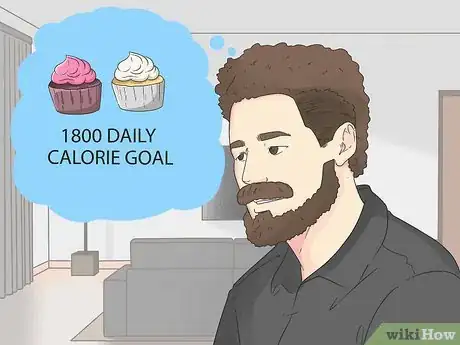This article was co-authored by Mirjam Quinn, PhD and by wikiHow staff writer, Janice Tieperman. Dr. Mirjam Quinn is a Licensed Clinical Psychologist and the Founder of Mirjam Quinn and Associates based in Illinois. With over 13 years of experience, she specializes in using cognitive-behavioral, mindfulness-based, and attachment theory grounded therapy techniques to provide psychological care for the whole person. Dr. Quinn also has a special focus on working with people from diverse and multicultural backgrounds and adoptive and blended families. She earned her PhD in Psychology from Purdue University and completed her internship at Butler University. Dr. Quinn is a member of the American Psychological Association (APA) and the APA Division for Peace Psychology and the Society for Child and Family Policy and Practice.
There are 10 references cited in this article, which can be found at the bottom of the page.
This article has been viewed 30,533 times.
Just five more minutes can’t hurt, right? Whether you’re binging a TV show, putting off an assignment, or doing some other guilty pleasure, it’s all too easy to let your willpower fall to the wayside. How are you supposed to put your foot down and say “no” to yourself in the heat of the moment? Don’t worry. We’ve been there before, and we’re here to help! Keep reading for plenty of tips and tricks to help you master the art of self-control, so you can say “no” to temptations and stay focused on what really matters.
Steps
Admit that you have a weakness.
-
The key to saying “no” is being honest with yourself. It’s completely normal and okay to have a weak spot—everyone does! Think about what temptation or situation always seems to get the best of you, whether it’s hitting the snooze alarm too often, spending too much time on social media, or something else entirely. Admitting your weakness helps you take a step in the right direction.[1] X Research source Here are a few examples of possible weaknesses:
- Playing video games instead of focusing on schoolwork
- Skipping a trip to the gym to hang out with friends
- Watching TV instead of going to bed at a good time
- Taking on an extra task at work even when your schedule is booked
Remove what’s tempting you.
-
You can’t say “yes” to something that’s unavailable. Look for ways to keep your most tempting items and activities out of sight and mind. It’s a lot simpler saying “no” to yourself when your temptation is out of the picture.[2] X Research source You might:
- Toss out any junk food in your pantry
- Install a web extension that blocks distracting websites
- Turn off your phone and put it in another room
- Log out of your streaming accounts
Set a clear goal for yourself.
-
It’s easier to say “no” when you have a goal to work toward. Think about what you want to accomplish, so you have a clear vision for the future. Try to make your goal “SMART”, or Specific, Measurable, Attainable, Realistic, and Time-based. If your goal is too vague or large, it’ll be a lot more difficult to follow through with.[3] X Research source Here are some examples of SMART goals:
- I’m only going to eat 2 desserts per week so I can meet my daily 1800 calorie goal.
- I’m going to go for a 30-minute walk after work instead of watching TV.
- I’m going to finish all of my math homework before checking my phone for 5 minutes.
- I’m going to finish my remaining 3 work assignments this week before taking on any new ones.
Keep tabs your goals.
-
Monitoring your progress helps you stay on track. Goal-tracking makes it a cinch to keep tabs on your daily habits and tendencies. Plus, it’s a great way to hold yourself accountable as you continue saying “no” to tempting activities.[4] X Research source Here are a few examples of goal tracking:
- Downloading a calorie-counting app
- Setting a timer while exercising
- Checking your computer’s search history each day
- Checking your total screen time on your phone
Picture how you’ll feel when you meet your goal.
-
Saying “no” now will lead to something even better in the future. Sure, it can be really frustrating to forego your favorite sweet treat or to force yourself out of bed when the alarm is blaring. But just think about how proud, satisfied, and accomplished you’ll feel when you reach your overall goal![5] X Research source
- Reaching your target weight will be much more satisfying than the few minutes of enjoyment you get from eating your favorite junk food.
- Finishing all of your homework early will feel so much better than cramming all night to complete assignments.
Create an “if-then” plan for yourself.
-
Chances are, you’re going to face off with your temptation sooner or later. Instead of being taken by surprise, make a future plan for yourself. This way, you can adapt to the situation while still staying on track with your goals.[6] X Research source Here are a few examples:
- “If I’m at an office party, then I’ll snack on the fruit and veggie platter.”
- “If I’m tempted to go on a certain website, then I’ll listen to some relaxing music.”
- “If I get the urge to go on my phone, then I’ll take a 5-minute walk outside.”
Remind yourself that you are in control.
-
Believing that you can say “no” is half the battle. It’s easy to feel like your willpower is out of your control, but this couldn’t be further from the truth. At the end of the day, you decide what you’ll do and when you’ll do it. Embracing this makes it that much simpler to put your foot down in tempting situations![7] X Research source You might tell yourself:
- “I woke up on time earlier this week, and I can do it again.”
- “I’m a strong, capable person who’s in control of my life.”
- “I don’t have to do anything I don’t want to do.”
Say “I don’t” instead of “I can’t.”
-
“I don’t” statements are much more empowering than “I can’t” statements. Telling yourself something like “I can’t go on my phone” or “I can’t eat brownies” only reminds you of your limitations, and may make it harder to maintain your resolve. “I don’t” statements, on the other hand, give you much more control, and make it a lot easier to follow through.[8] X Research source Here are few examples:
- Say “I don’t watch Hulu all night” instead of “I can’t watch Hulu all night”
- Say “I don’t drink wine” instead of “I can’t drink wine”
- Say “I don’t spend a lot of time online” instead of “I can’t spend a lot of time online”
Lean on a friend for support.
-
A good friend can help push you forward when things get tough. Some days are definitely trickier than others, and there’s nothing wrong with admitting that you’re struggling. Call, text, or meet up with a friend to let them know what you’re going through.[9] X Trustworthy Source American Psychological Association Leading scientific and professional organization of licensed psychologists Go to source You might say:
- “I had a really stressful day at work, and I’m really tempted to make an impulse buy. Could you help talk me out of it?”
- “I thought I could resist the urge to smoke, but I’m having a really hard time right now. Do you have any advice?”
- “I don’t feel like I’m making any progress in my weight loss goals, and I’m really tempted to just give up. What should I do?”
- “I really enjoy spending time with my friends, but I always feel like I’m spreading myself too thin. How do I fix this?”
Forgive yourself if you slip up.
-
Building self-discipline is a journey, not a race. Think about it this way—if it was easy to say “no” to your temptation, then it wouldn’t be a temptation in the first place! Everyone has their moments of weakness, and you have nothing to be ashamed of. Saying “no” to yourself takes time and practice, so it’s important to go easy on yourself.[10] X Research source
Grab a healthy snack.
-
Hunger can really throw a wrench in your willpower. “Hanger” is no laughing matter—this toxic combo of hunger and irritation makes it all too easy to say “yes” in a moment of weakness. When your stomach starts growling, munch on a healthy snack before making any major decisions.[11] X Research source Here are a few great snacks to choose from:
- Your favorite fruit or veggie
- A slice of whole-grain bread
- A hard-boiled egg
- A cup of yogurt[12] X Research source
Get a good night’s sleep.
-
It’s harder to say “no” to yourself if you’re tired. Research shows that a good night’s sleep can help you practice self-control and resist whatever temptation the day throws at you.[13] X Expert Source

Licensed Clinical Psychologist Expert Interview. 3 March 2022. Try to get at least 7 hours of sleep if you’re an adult, and at least 8 hours of sleep if you’re a teenager.[14] X Research source
Meditate for 10 minutes.
-
A short round of mindful meditation can help boost your self-control.[15] X Expert Source

Licensed Clinical Psychologist Expert Interview. 3 March 2022. Take a moment to let your thoughts drift about in your mind. Then, practice focusing on the present. Believe it or not, this simple exercise can help you to strengthen your willpower.[16] X Trustworthy Source American Heart Association Leading nonprofit that funds medical research and public education Go to source
Visit a therapist for extra support.
-
A mental health professional can help you tackle your willpower issues. Schedule an appointment with a therapist and let them know what you’re struggling with.[17] X Expert Source

Licensed Clinical Psychologist Expert Interview. 3 March 2022. They can help you come up with an actionable and manageable way to tackle your temptations, so you can say “no” to yourself more easily.[18] X Trustworthy Source American Psychological Association Leading scientific and professional organization of licensed psychologists Go to source
You Might Also Like














References
- ↑ https://www.inc.com/amy-morin/6-ways-to-develop-the-self-discipline-you-need-to-reach-your-goals.html
- ↑ https://www.forbes.com/sites/francesbridges/2018/06/28/5-ways-to-improve-self-control/?sh=57cc675c21d5
- ↑ https://www.psychologytoday.com/us/blog/science-choice/201703/10-strategies-developing-self-control
- ↑ https://www.psychologytoday.com/us/blog/science-choice/201703/10-strategies-developing-self-control
- ↑ https://www.inc.com/amy-morin/6-ways-to-develop-the-self-discipline-you-need-to-reach-your-goals.html
- ↑ https://www.psychologytoday.com/us/blog/science-choice/201703/10-strategies-developing-self-control
- ↑ https://www.psychologytoday.com/us/blog/science-choice/201703/10-strategies-developing-self-control
- ↑ https://academic.oup.com/jcr/article/39/2/371/1797950
- ↑ https://www.apa.org/topics/personality/willpower-living
- ↑ https://www.forbes.com/sites/francesbridges/2018/06/28/5-ways-to-improve-self-control/?sh=57cc675c21d5
- ↑ https://www.entrepreneur.com/article/287005
- ↑ https://www.healthlinkbc.ca/healthlinkbc-files/healthy-snacks-adults
- ↑ Mirjam Quinn, PhD. Licensed Clinical Psychologist. Expert Interview. 3 March 2022.
- ↑ https://www.sleepfoundation.org/how-sleep-works/how-much-sleep-do-we-really-need
- ↑ Mirjam Quinn, PhD. Licensed Clinical Psychologist. Expert Interview. 3 March 2022.
- ↑ https://www.heart.org/en/healthy-living/healthy-lifestyle/mental-health-and-wellbeing/how-to-boost-your-willpower-to-help-make-healthy-choices-easy
- ↑ Mirjam Quinn, PhD. Licensed Clinical Psychologist. Expert Interview. 3 March 2022.
- ↑ https://www.apa.org/topics/personality/willpower-living
About This Article



























































